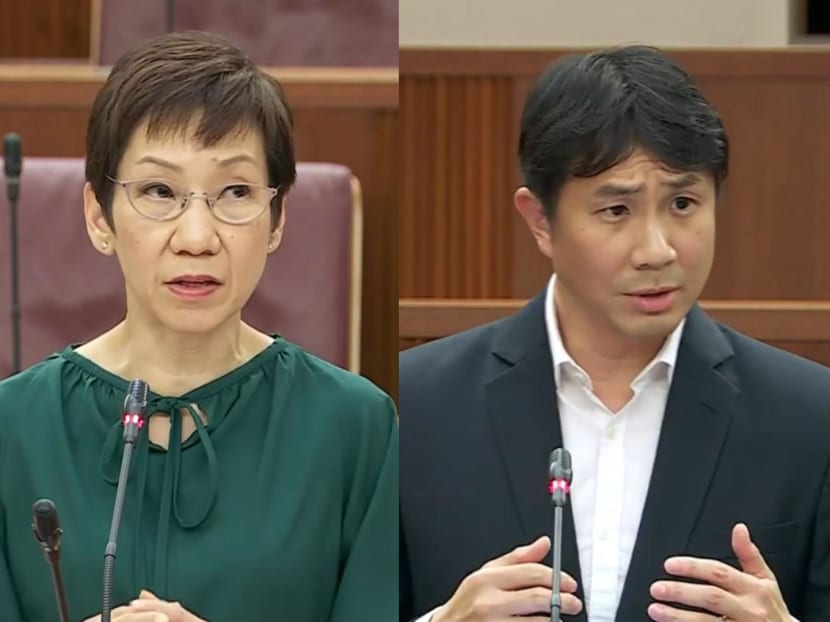Heated exchange between Grace Fu and WP MP Jamus Lim over flexible carbon pricing based on economic conditions

Ms Fu and Associate Professor Lim speaking in Parliament on Nov 8, 2022.
- Workers' Party MP Jamus Lim asked Minister for Sustainability and the Environment Grace Fu whether there should be flexibility in the carbon tax pricing to take into account prevailing economic conditions
- Ms Fu asked Associate Professor Lim to share what he thinks the Government should do instead
- The pair then got into a heated exchange lasting 10 minutes
- At one point, Leader of the Opposition Pritam Singh asked both parties to be seated when the other was speaking, as per usual parliament etiquette
SINGAPORE — A heated exchange between Minister for Sustainability and the Environment Grace Fu and Workers' Party (WP) Member of Parliament (MP) Jamus Lim broke out in Parliament on Tuesday (Nov 8) over whether there should be flexibility in carbon pricing to take into account the economic situation.
The 10-minute exchange took place after Ms Fu delivered her wrap-up speech during the second reading of the Carbon Pricing (Amendment) Bill, which proposes increasing the carbon tax to S$25 per tonne for greenhouse gas emissions in 2024 and 2025. This was later passed in Parliament.
Associate Professor Jamus Lim, MP for Sengkang Group Representation Constituency, asked Ms Fu whether her ministry sees the importance of distinguishing between an appropriate carbon pricing level and how to get to the said level.
In response, Ms Fu asked Assoc Prof Lim to share his thoughts on how the ideal carbon price should be reached by the Government, resulting in a quickfire back-and-forth exchange between both sides.
As the two butted heads, Leader of the Opposition Pritam Singh stepped in at one point and said that either party ought to be seated when the other was speaking, as per usual parliament etiquette.
Assoc Prof Lim also asked whether companies would actually feel uncertain about operating in Singapore should the carbon price be lowered, noting that Ms Fu had mentioned in her speech that businesses would struggle to operate if there is uncertainty about the carbon tax prices.
“'I'm befuddled because even now, the Government routinely alters levers or policies, such as the interest rate when there is uncertainty on a year-to-year basis about the level of interest rate. Yet, businesses continue to invest,” he said.
The following are edited excerpts of their exchange:
Ms Fu: Associate Professor Lim started his speech earlier saying that we have the theory right, but we need to get the implementation right. So I’ll like to ask him for his suggestion on how the Government should be positioning the carbon tax in his way. What will be your target price? Is it S$100 (per tonne)? If it is long run, by which year? Is it still 2030?
Assoc Prof Lim: The Government has not also committed to a S$50 to S$80 (per tonne by 2030) that is well stated.
Ms Fu: We have, S$50 to S$80 (per tonne by 2030) is our range. So what is your range?
Assoc Prof Lim: S$58 to S$133 (per tonne) with a midpoint...
Ms Fu: So your range is higher than the Government’s, is that correct?
Assoc Prof Lim: The lower bound is lower than the Government’s upper bound.
Ms Fu: Alright, so can you please tell me, if you are the Minister for Sustainability and the Environment, how would you reach this number. This is the end of 2022, how would you describe to companies the glide path (to this price)?
Assoc Prof Lim: That was the content of my speech. I suggested that we could do it incrementally the way that the ministry suggested, but I also suggested we could allow the specific level to adjust upward and downward according to economic conditions.
Ms Fu: So are you then saying that we can go out to the world and say ‘Sorry, I make the 2030 NDC (Nationally Determined Contribution) on the basis of certain economic conditions, and now that economic conditions are bad — there's a war, there is high inflation and energy — my NDCs don't count because I need to glide further up?’
Assoc Prof Lim: I think I was clear that the adjustments upwards and downwards are the same way that business cycles go upward and downward. So you would have it lower in a given year because of economic conditions, but when things picked up, you would raise it back so that you met the original targets.
Ms Fu: You're suggesting a very variable carbon tax rate... of S$58 to S$133 per tonne but without knowing how it's going to get there, not even knowing what 2024’s price is going to be.
Assoc Prof Lim: If you set the target, but are able to adapt to economic conditions, the same as how interest rates are...
Ms Fu: So what is your rate for 2024?
Assoc Prof Lim: It is not complicated.
Ms Fu: So what is your rate? What is the number?
Assoc Prof Lim: So we can go with the Government's proposal and say start with S$25. We would need to look at economic conditions.
Mr Singh: Point of order. I understand that when a member asks a question, the other member sits down and vice versa.
Ms Fu: I apologise, Mr Speaker. I will sit down. Can you please tell me? Describe to me your carbon tax glide path in numbers? Because businesses need to know, so can you tell me with some certainty what is that variable portion, even if you say S$25 (per tonne) for the next two years to come? What is the variation?
Assoc Prof Lim: Again, we are not opposed to the original price for the next year, and the subsequent year. We are comfortable with going with S$25 per tonne that was originally there. But I’m pushing for the flexibility to adjust it upward or downward, just to take account of economic conditions, the same way we alter interest rates.
Ms Fu: This is not a fiscal policy. This is a policy to change our energy, our energy mix and our energy use. So whether there is going to be an economic downturn or not, this is a change that we all need to make…. If there's an interest rate problem or economic problem, of course, we have to deal with it in other ways. But the signal to the companies must be that this is a path the Government is going ahead...
Ms Fu:... I am receiving slightly mixed messages (from you): 'We want to fly the environmental flag; We want to be sustainable; We want to be able to address our constituents who want us to be as green as possible'. But when it comes to the hot decision of making changes, making company change like investing in renewable, fuels efficiency, reducing utility, reducing water, circular economy, reducing waste, 'hang on I think that's an economic condition'.











